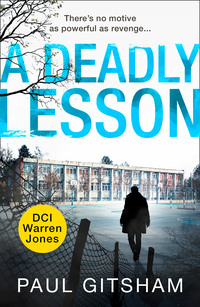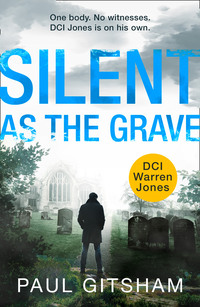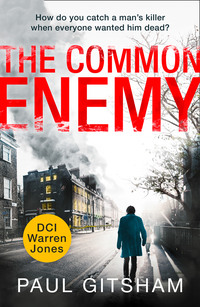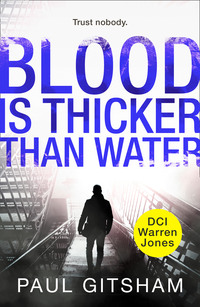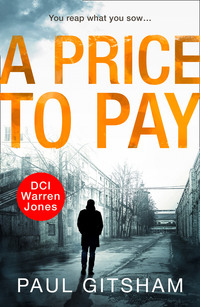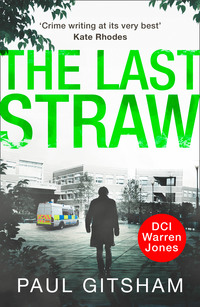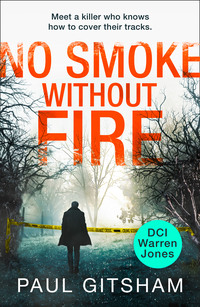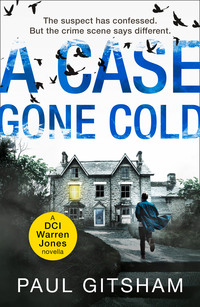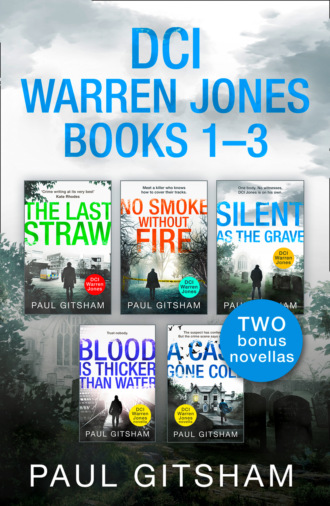
Полная версия
The DCI Warren Jones Series Books 1–3
With nothing else to be gained from the bloody office, Jones turned away from the carnage. He glanced at his watch: eleven p.m.
You were complaining how bored you were, Warren. Well, you know what they say: ‘be careful what you wish for’.
It looked as though Susan and the in-laws would have to finish the wine without him.
Chapter 2
The alarm clock buzzed angrily. With a groan, Warren swiped the OFF button. Prising an eye open, he saw that it was six-thirty. His head felt mushy and his mouth was dry. It seemed as though he’d barely closed his eyes. That wasn’t a huge exaggeration, given that he’d arrived back home at well past four a.m. Resisting the urge to indulge himself in another ten minutes’ sleep, lest he didn’t awaken again, Warren swung his legs out, planting his feet on the woollen rug that covered the floor by the bed. Behind him, Susan grumbled in her sleep and rolled over.
Ordinarily, when Warren worked night shifts or Susan stayed up late marking, the night owl would take the spare bed in the guest room to avoid waking the sleeping partner. With the in-laws visiting that wasn’t an option this time. It hadn’t mattered though. When Warren had tiptoed into the bedroom, Susan had been flat on her back, her comatose status testimony to the sedative effect of red wine. Indeed, Warren had noticed a second empty bottle on the coffee table in the lounge. He smiled to himself, glad that he wouldn’t be here in a few hours when his slumbering wife awoke. Never a morning person at the best of times, Susan also wasn’t a big drinker and he suspected she would wake up grumpy and feeling a little the worse for wear.
He padded quietly into the bathroom, passing the guest room on his way. Through the closed door he could hear strident snoring. He wouldn’t like to put money on who was the culprit, Bernice or Dennis.
Warren showered quickly and brushed his teeth. The elderly pipes in the house groaned, reminding Warren that he still hadn’t called a plumber, but the rhythmic noise from the guest room didn’t miss a beat. By now, Warren was feeling marginally more human. As he shaved he stared at the familiar face in the mirror. Aside from a little redness around the eyes and a couple of faint dark smudges beneath them, he didn’t look too bad. He still had the good looks that Susan claimed had attracted her years before; a firm jaw and eyes that could switch in an instant between friendly and hard, a trick he’d learnt during his earliest days on the force. His dark brown hair, just this side of black and still neat from his trip to the barber’s prior to starting this job, had yet to sport its first grey hair, although he was under no illusion that it would be long before his new position changed that.
Creeping back into the master bedroom, Warren slipped on the previous night’s suit and tie, remembering this time to retrieve his warrant card from his other jacket. Pausing to look at his slumbering wife, he risked a peck on the lips, tasting the wine on her breath. Still asleep, she nevertheless smiled.
Outside, the sun was already up although it had yet to chase away the night’s chill. Warren had grabbed a banana from the fruit bowl before leaving the house, and now crammed the remains of it into his mouth as he unlocked his car. The birds were singing loudly, but the rest of the street was quiet. Most of Warren and Susan’s neighbours worked regular office hours, so few would be up and about at seven a.m. on a Saturday. Similarly, the roads were quiet and Warren pulled into the small staff car park at the rear of Middlesbury Police Station barely ten minutes later. A few cars dotted the tarmac, most noticeably a brand-new Mercedes. Warren felt his stomach contract: his boss, Detective Superintendent John Grayson, was already in.
Middlesbury Station was something of an anomaly in Hertfordshire. Most of the county’s detectives now worked out of the joint Hertfordshire and Bedfordshire Major Crime Unit based in Welwyn Garden City. However, a combination of the distance from Welwyn and the rapid growth of Middlesbury meant that the town’s police station sported several custody cells and despite the budget cutbacks had retained its small but fully operational CID unit. Many of the other towns in the local area had to make do with a reception desk manned nine-to-five with an emergency telephone connected to Welwyn for out-of-hours emergencies.
Swiping his access card and keying in his pin number gave Jones access to the building and he headed directly for the largest of the incident rooms. He had scheduled this morning’s meeting for eight a.m., timing it to catch the day shift as they came on duty. He glanced at his watch: seven-fifteen. Plenty of time to go over his briefing notes and set up the chairs. As he approached the room he spotted that the door to the superintendent’s office was ajar. It would be rude not to pop his head in, he decided, plus it wouldn’t hurt for the boss to notice how early he was in.
He rapped confidently on the door, his knock answered immediately with a curt, “Come in.” Stepping in, Jones stopped in surprise. Sprawled in a large, comfy-looking visitor’s chair, sipping a cup of freshly brewed coffee, was Detective Inspector Tony Sutton.
“Ah, good morning, Warren. Tony was just filling me in on last night’s discovery.”
So that’s how it is going to be, thought Jones, pushing down a sudden flash of annoyance. His first big case since moving here and already Sutton was trying to muscle in on his territory, ingratiating himself with the boss.
Sutton smirked. “Just the juicy bits, guv. Thought I’d leave the details to you.”
“So kind, Tony,” commented Jones. If the super noticed the tension crackling between the two men, he gave no sign of it.
“This is a big case, Warren. A murder is a nasty business at the best of times, but this one could be especially problematic.” The superintendent leant back in his chair, rubbing his eyes wearily. “The vice chancellor of the university phoned me at six this morning, ‘to express his concern’ and emphasise the need for a ‘speedy resolution’. If I ever find out which bugger gave him my home phone number, they’ll spend the next twelve months telling primary-school kids not to talk to strangers.
“Either way, we do need to solve this quickly and decisively. A murderer running about the campus could be disastrous for the university’s reputation, especially with next month’s Controversies in Science conference. The guest list for that event looks like a who’s who of shit-stirrers. Richard Dawkins and the President of the British Union for the Abolition of Vivisection are some of the less controversial speakers. If they think we can’t guarantee their safety, the organisers may well cancel the conference or, worse, up sticks to bloody Cambridge.”
Sutton grunted. “Rumour has it, King’s College wanted to host it, but Channel 4, who are footing the bill, reckoned it would seem too elitist. You can bet they’ll be the first in line to offer their facilities again if we lose the conference.”
Jones tried to hide his puzzlement. They seemed to be taking this whole thing rather personally. During his time in the West Midlands, Jones had worked dozens of serious cases linked to the region’s several universities. The reputation of the university in question hadn’t been a huge worry. As far as the police were concerned, a crime was a crime and it would be solved with no more or no less vigour than an offence occurring anywhere else on their patch. Seeing Jones’ lack of comprehension, Grayson leant back in his chair, assuming a professorial air.
“Look around you, Warren. Middlesbury is a small market town, with bugger-all local industry. The decision to turn the technical college into a university forty-odd years ago gave this place a lease of life. It’s the biggest employer in the area and the students bring millions into the local economy. Part of the attraction for students is the location. We’re seen as a safe, quiet place to live and study. We have none of the hustle and bustle of Cambridge or the crime of some of the Essex towns. It’s a huge draw for overseas students, who bring in massive amounts of foreign money — even if some of our more conservatively minded residents aren’t too fond of them.”
Nodding his understanding, Jones tried not to feel patronised by the unnecessary lecture and oblique reference to his status as a newcomer, opting to reply with a simple, “I see.”
“So, DCI Jones, I want you to give this case top priority. I’ll back you completely resource-wise. Pull everyone off what they are doing and get them to focus fully on solving this murder. We have some spare money in the Major Incident Budget, so feel free to offer overtime and buy in all the forensics you need. I’ll sweet-talk Uniform into giving us some bodies for routine stuff. Let’s nail this bastard.”
Jones nodded, not trusting himself to say anything. He could see how it was going to be. This case was a big deal and a lot was resting on his shoulders. It was his first case as a DCI and it looked as though it was going to be sink or swim. He had the deeply uncomfortable feeling that the outcome of this case would set the tone for the rest of his time in Middlesbury. Suddenly, the banana he had eaten for breakfast seemed to be weighing heavily in his stomach. His palms felt damp and his collar too tight. As if a major incident such as this weren’t enough for him to deal with, now he had to negotiate local politics as well. For the first time since his move, Warren allowed the ever-present whisper of doubt that lurked in the back of his mind speak louder.
He’d known that becoming the DCI of such a small unit in a semi-rural town would probably be less glamorous and exciting than his previous job with West Midlands Police and that the shameful downfall of DCI Gavin Sheehy had left a lot of collateral damage that he might well have to deal with, but the simple fact was that there were already plenty of DCIs in the WMP and he’d risked getting stuck in a rut as a detective inspector. If he ever wanted to make it as a detective superintendent or even a chief superintendent, he needed the command experience. Consequently, when the vacancy in the Middlesbury CID unit had become available, Jones had been encouraged to apply.
Making his excuses and repressing the treacherous voice at the back of his mind again, Jones left the office and went into the main briefing room. A large conference room, it lacked the sophisticated wall-mounted plasma screens that were being installed as he left the West Midlands. Nevertheless there were several oversized marker boards on wheels and plenty of chairs. As a concession to the twenty-first century, a ceiling-mounted projector allowed video and computer imagery to be displayed on the back wall. Most importantly, a large urn bubbled away on a corner table, next to a wicker basket filled with packets of tea, coffee, sugar and powdered creamer. A stack of cardboard cups served those without a mug. The old coffee tin now doing double duty as an honesty jar was suspiciously empty, and Jones hid a smile. Human nature was human nature, and coppers were all too human. Before doing anything else, Jones made himself a strong black coffee. After a moment of indecision, he emptied three sachets of sugar into the cup. The resulting brew was far sweeter than he liked, but the caffeine and sugar hit would hopefully chase away the remaining cobwebs. As an afterthought he chucked a fifty-pence piece into the honesty jar — lead by example and all that…
It was now five to eight and the CID day-shift were starting to file into the room. After two weeks, Warren could put a name and a rank to most of the faces. Some acknowledged him with a nod, one or two with a cautious, “Good morning, sir.” Warren was again reminded of the veiled scrutiny with which he was being viewed. Suspicion was probably too strong a word, but there was still a certain wariness. He was acutely aware that he was on probation with these people and that he had to prove himself to be up to the job.
By eight, he judged the room to be full, with a couple of dozen detectives of various ranks seated in rows. Grayson and Sutton stood at the back, watching. Calling for quiet, he wished all those assembled a good morning. Taking a deep breath, he launched in.
“As I am sure that most of you have heard, there has been a murder at the university in the Biology building up on Mills Road. At 22:19 hours last night a call was received from a member of the public and approximately ten minutes later two uniform colleagues on patrol confirmed the finding of the body of a middle-aged white male in a first-floor office within the main research wing. Paramedics confirmed that the victim was dead when they arrived. Preliminary identification is that of a Professor Alan Tunbridge, the occupant of the office. The PM will be held later today, but early indications are that the deceased was bludgeoned, possibly with a souvenir granite rock, before having his throat sliced open. Probable cause of death, exsanguination.”
A low murmur rippled around the room. Looking around, Warren was relieved to see that he had everyone’s attention. Or almost everyone — Grayson and Sutton had their heads together, quietly talking. Neither of them glanced his way. Forcing away any thoughts about what they might be discussing, Warren continued.
“The body was found by a Thomas Spencer, one of the professor’s graduate students who happened to be working late that night also. Time of death has been tentatively put at no earlier than about 21:30 hours. Scenes of Crime officers made a preliminary investigation and will resume their work this morning.”
A hand promptly went up: Detective Sergeant Hutchinson.
“Do we know who was in the building at that time and does Spencer have an alibi?”
“Unfortunately, we’re waiting for the head of campus Security to return from up north before we can review the CCTV footage and the building’s swipe-card logs to see who came in and out. The two guards on duty last night were based in the main security building on the other side of the campus and don’t have the know-how or the computer passwords to access that information.”
A few grumbles went around the room and Jones heard at least one muttered utterance about “bloody rent-a-cops”.
Ignoring the dissent, Warren continued.
“The building’s fire-safety log claims that when we arrived there were only two people in the building, although we can’t yet identify them. The system simply counts people in and people out. The two occupants were presumably Spencer and the deceased. None of the building’s fire exits had been opened and all the windows were shut. A search by uniform found no other people in the building. Spencer claims that he was working alone in a small equipment room at the opposite end of the building for about an hour before he discovered the professor’s body. There are no direct eyewitnesses but he says he bumped into two other students on the way over there who were just leaving for the pub. Apparently the room also has a swipe-card entry system to protect the expensive equipment inside. First thing we need to do when the head of Security arrives is check out Spencer’s story.”
A hand rose at the back. “Where is Spencer at the moment?”
“Back home. He’s due to come in for another interview this afternoon. Forensics bagged him and tagged him at the scene last night and he accompanied us here for a full trace-evidence exam and to give a preliminary statement. So far he hasn’t called for a lawyer and is co-operating fully, so we haven’t yet arrested him.” This last point was important. The moment that a suspect was arrested the clock started ticking and the police only had a short time to decide whether to release the suspect — on police bail if appropriate — or charge him and get him before a judge. By delaying arresting Spencer, Jones had successfully pushed back that deadline. However, it was a dangerous game and those questioning him would have to be very careful about making sure that he knew and understood his legal rights, lest they incur the wrath of any future defence counsel and scupper any prosecution before it even got off the ground.
Another hand went up. “What about Tunbridge’s immediate family: wife, partner, kids?”
“Family Liaison broke the news to his wife last night. His kids live away and are on their way home. Early indications are that the wife was having a meal in a busy restaurant with a half-dozen friends at the time of the murder. We’ll check out her alibi later today.”
Looking around the room, Jones saw that nobody else had any questions. They seemed to be happy to let him get on at his own pace. Jones decided to paraphrase what the super had said to him before this meeting, figuring he couldn’t really put a foot wrong if he quoted the boss.
“OK, people. This case is to be treated as our number one priority. I don’t need to remind you that most murders are solved in the first twenty-four to forty-eight hours; the clock is already ticking. I will start assigning roles in a moment. Those of you that aren’t given an immediate task should use the time to lock down any outstanding jobs so that we can turn all of our attention over to solving this case.” Around the room there were a few quiet grumbles, no doubt from those worrying about the impact this temporary shutdown might have on their own caseload, but nobody dissented openly. They all knew the score without being told, Warren realised. Yet another example of the local instincts that he would need to develop if he was to succeed in this posting.
Warren consulted his notepad.
“Immediately after this briefing, DI Sutton and I will meet with the lab’s experimental officer, Dr Mark Crawley, and the head of the Biology department, to see what we can find out about the deceased and have a look at what names come up. Head of Security should be on campus in an hour or so. I’ll need somebody to meet him and have a quick look at any CCTV footage and the building’s swipe-card access log.
“The neighbourhood around the building is mostly non-residential. However, there are a few houses up the north end of the road. DS Khan, I’d like you to organise a few bodies to go door knocking.” A quick nod from the small man. “I’d also like you to go and see if the security guards working the warehouses on the opposite side of the road saw or heard anything. Check if any of their cameras point towards the university — it’s a long shot but they may have picked up something.”
He looked around the room, searching the assembled faces.
“DS Richardson, can you liaise with Traffic and see if any of their cameras have spotted anything? Remember, people, the time of death is likely to have been after 21:30 hours and Spencer’s phone call was logged at 22:19 hours. Assuming that there was another person involved, they may have been in the area for several hours before the attack.” A short squat forty-something clutching a bottle of mineral water nodded her agreement.
“DS Kent, I want you to set up an incident desk to collate incoming information. You’ll be the shift co-ordinator — everybody should report their progress to you. Get HOLMES up and running and get Welwyn up to speed in case we need resources.”
Kent nodded once and cracked his knuckles. A grey-haired man, well into his fifties, he was Middlesbury’s resident expert on the Home Office’s national serious crime database, HOLMES2. He had been one of the first people Jones had met after arriving at Middlesbury and his reputation for efficiency had preceded him. Even if he hadn’t been on shift this morning, Jones would probably have telephoned him and offered him double time. For his part, Kent looked excited at the challenge. Middlesbury wasn’t quite the back of beyond as far as policing was concerned; nevertheless a big juicy murder, as this could well turn out to be, was a welcome diversion from the car thefts, drunken assaults and mid-level drug dealing that the station usually dealt with.
“The rest of you, get yourselves ready to move at a moment’s notice. As we identify witnesses I want us to be able to pick them up for questioning before they get a chance to swap stories. Let’s hit the ground running, folks.” He paused, looking for questions. None, just impatient-looking faces, ready to get on with the task.
“Dismissed.”
Immediately the assembled officers jumped to their feet, the experienced Detective Sergeants Khan and Richardson promptly corralling the detective constables into groups to assign them their tasks. Without so much as a glance in his direction, Sutton and Grayson headed out of the double doors in the direction of Grayson’s office. Warren frowned, tempted to go after them, but he had more pressing concerns. Moving swiftly, he intercepted a young DC before she could be snagged by DS Khan.
“Karen Hardwick?” The young woman flushed slightly, no doubt a little taken aback to be identified by name by the new DCI.
“Yes, sir?”
Warren felt a twinge of sympathy for the poor girl. A probationer, she had only just finished her detective training, arriving at the station almost as recently as Jones. He vividly recalled his first few months as a trainee detective constable, desperately scared of screwing up or asking a stupid question in front of the boss. He’d hidden at the back of briefings, hoping to avoid catching the eye of anybody above the rank of sergeant.
“I’ve been reading your personnel file and I see that you were at university before you joined the force?”
Immediately, Warren cursed himself for his clumsy phrasing. It probably sounded to the poor woman that he’d pulled her file up especially, when in actual fact he’d been reading the files of everyone in the unit, trying to get to know his new team.
“Yes, sir. Bath, then Bristol.” Karen looked puzzled. These days graduate recruitment was the norm, not the exception.
“I believe that you did some sort of biological sciences degree?”
“Yes, sir, I did a bachelor’s degree in Biochemistry and then a masters by research in Molecular Biology.”
“So I would assume that your degrees involved spending time in laboratories?”
“Yes, I did a twelve-month work placement in a pharmaceutical company during my first degree, then my master’s degree involved three rotations in different laboratories within the Biology department.” Karen now had an inkling where this might be leading.
“Well, Karen, my gut is telling me that the reasons for this murder might lie in that university department. I may need an interpreter, somebody who is familiar with the system and the language.”
“I’ll do whatever I can, sir.”
“Good. Now let’s go and round up DI Sutton. We’ve got some trees to shake and I get the impression that the DI is good at shaking.”
Chapter 3
Jones, Sutton and DC Karen Hardwick were greeted in the lobby of the Department of Biological Sciences research building by a different young PC from the previous night. After crossing them off his clipboard, he radioed ahead to let the crime scene technicians know that they had arrived. Apparently, Dr Mark Crawley, the laboratory’s experimental officer, was already with them.
Following the same route as the night before — less than ten hours ago, Jones realised wearily — the three police officers headed towards the crime scene. This morning it was necessary to stop a few doors short of the office where the professor’s body had been found, since the whole end of the corridor was now blocked off with blue and white crime scene tape.
Just past the barrier was a set of wooden double doors, with a large sign proclaiming “Tunbridge Group. Microbial Biology”. Next to it were yellow warning stickers with the universal signs for biohazards and, Jones noticed with a touch of discomfort, radiation. A few metres further along the corridor the door to Tunbridge’s office was open, white-suited technicians hard at work. A uniformed constable stood to attention next to the tape, his hands behind his back. Jones pretended not to see the copy of The Sun inexpertly concealed behind him. He had spent plenty of time as a uniformed officer guarding crime scenes and knew just how desperately dull it could be.


